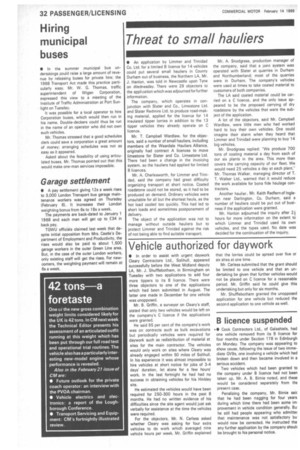Hiring
Page 34

If you've noticed an error in this article please click here to report it so we can fix it.
municipal Threat to small hauliers
buses
• In the summer municipal bus undertakings could raise a large amount of revenue by releasing buses for private hire; the 1968 Transport Act made this practice particularly easy. Mr. W. G. Thomas, traffic superintendent of Wigan Corporation, expressed this view to a meeting of the Institute of Traffic Administration at Port Sunlight on Tuesday.
It was possible for a local operator to hire Corporation buses, which would then run in his name. Double-deckers could thus be run in the name of an operator who did not own such vehicles.
Mr. Thomas stressed that a good schedules clerk could save a corporation a great amount of money; arranging schedules was not as easy as it appeared.
Asked about the feasibility of using articulated buses, Mr. Thomas pointed out that this would make one-man services impossible.
Garage settlement
• A pay settlement giving 12s a week rises to 3,000 London Transport bus garage maintenance workers was agreed on Thursday (February 6). It increases their London weighting bonus from 6s to 18s a week.
The payments are back-dated to January 1 1968 and each man will get up to .£34 in back pay.
TGWU officials claimed last week that despite initial opposition from Mrs. Castle's Department of Employment and Productivity, the rises would also be paid to about 1,500 garage workers in the outer Green Line area. But, in the case of the outer London workers, only existing staff will get the rises. For newcomers, the weighting payment will remain at 6s a week. • An application by Limmer and Trinidad Co. Ltd. for a limited B licence for 14 vehicles could put several small hauliers in County Durham out of business, the Northern LA, Mr. J. Hanlon, was told in Newcastle upon Tyne on VVednesday. There were 29 objectors to the application which was adjourned forfurther information.
The company, which operates in conjunction with Slater and Co., Limestone Ltd. and Slater Redmire Ltd. to produce road-making material, applied for the licence for 14 insulated tipper lorries in addition to the 13 tipper vehicles they already operate on C licence.
Mr. T. Campbell Wardlaw, for the objectors, said a number of small hauliers, including members of the Weardale Hauliers Alliance, originally had contract A licences to move limestone for Slater and Co. Limestone Ltd. There had been a change in the invoicing system, so the hauliers had applied for limited B licences.
Mr. A. Charlesworth, for Limmer and Trinidad, said the company had great difficulty organizing transport at short notice. Coated roadstone could not be stored, so it had to be produced on demand. Ordinary vehicles were unsuitable for all but the shortest hauls, as the hot load cooled too quickly. This had led to short loads and sometimes postponement of delivery.
The object of the application was not to manage without outside hauliers but to protect Limmer and Trinidad against the risk of not being able to find suitable transport. Mr. A. Snodgrass, production manager of the company, said that a joint system was operated with Slater at quarries in Durham and Northumberland; most of the quarries were in Durham. The company's vehicles were used at times to take coated material to customers of both companies.
The LA said coated material could be carried on a C licence, and the only issue appeared to be the proposed carrying of dry roadstone by the vehicles that were the subject of the application.
A lot of the objectors, said Mr. Campbell Wardlaw, were little men who had worked hard to buy their own vehicles. One could imagine their alarm when they heard that Limmer and Trinidad were planning to buy 14 big vehicles.
Mr. Snodgrass replied: "We produce 700 tons of coating material a day from each of our six plants in the area. This more than covers the carrying capacity of our fleet, We would need 25 vehicles a day at each plant." Mr. Thomas Walker, managing director of T. T. Walker Ltd., warned that it would reduce the work available for bona fide haulage contractors.
Another haulier, Mr. Keith Redfern of Ingleton near Darlington, Co. Durham, said a number of hauliers could be put out of business if the application were granted.
Mr. Hanlon adjourned the inquiry after 24 hours for more information on the extent to which Limmer and Trinidad used its own vehicles, and the types used. No date was decided for the continuation of the inquiry.


















































































































